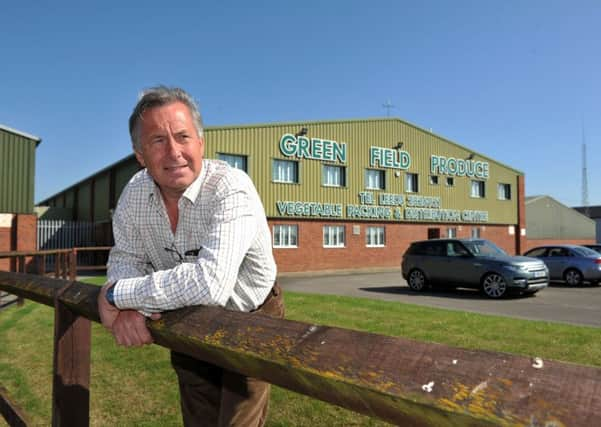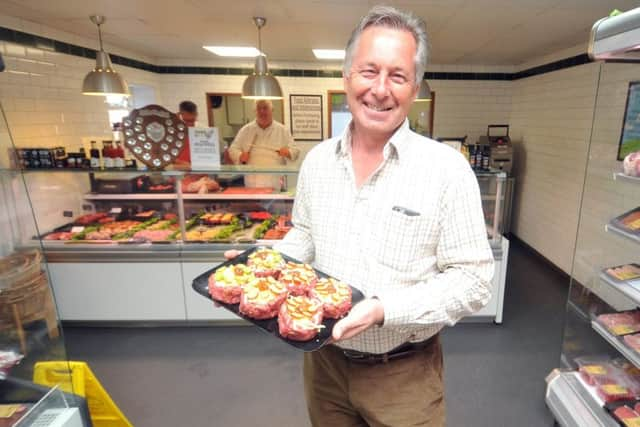Farm of the Week: Selling vegetables is a direct concern again at Green End


Simon is a seventh generation farmer at Carlton, near Rothwell where his forbears started with 25 acres in the 18th century when the hamlet was known as Ouzlewell Green. Today, the operation runs to 2,900 acres from the outskirts of Barnsley, South Yorkshire to Church Fenton, North Yorkshire. Five years ago a farm shop was opened, a small-scale affair in comparison to the cereal and vegetable crops traded through Green Field Produce of which Simon is managing director; and rhubarb, that brought his father John Dobson the title ‘Rhubarb King’ in the 1960s-70s.
Next weekend, Green End Farm and Rhubarb Triangle Farm Shop will host their third Open Farm Sunday event. It’s a far cry from Simon’s daily activity in dealing with the likes of Asda and Morrisons whom he supplies with cauliflower, broccoli, sprouts and cabbages from around 850 acres.
Advertisement
Hide AdAdvertisement
Hide Ad“I’m on a trailer all day talking to people on our farm tour. Each tour lasts around half an hour and I’m able to give people a little more knowledge about what we do and why we do it.


“I do put the message across that a lot of small family farms are no longer viable and that cost pressures now mean most things have to be done on a larger scale, but the strength of the message is about seasonality and buying British. If we don’t support the likes of sheep, pig, beef and dairy farmers the beautiful countryside we all enjoy will soon be no longer.”
Having driven the farm business from around 500 acres when he took over from his father around 30 years ago to nearly six times larger and having expanded the vegetable growing operation massively, the move to opening a farm shop may have surprised others. Simon sees what they have achieved in five years as another example of reconnecting with the public.
“It’s going back to what we used to do, serving the local community with vegetables. We had started selling free range eggs from the farm manager’s garage about eight years ago and were getting questions from customers saying they’d seen that it was our produce in Morrisons and why couldn’t they buy direct. We had a range of original farm buildings that’d been in jeopardy of falling down so we converted them and from a small start we added a butchery and a deli.”
Advertisement
Hide AdAdvertisement
Hide AdThe opening of the butchery brought Simon closer to where the farm business was under the lead of his grandfather John Edward Dobson in the early 20th century.


“We now have livestock back on the farm, rearing cattle, sheep and pigs for the farm shop which is quite appropriately in the area of the farm where the dairy cows were housed. My grandfather grew his first forced rhubarb in the loft above the dairy cows, with the heat from them aiding the growth of the crop in the dark during winter.
“The farm shop has been like a breath of fresh air. It’s very different to our other activities and dealing directly with the customer you get a real feel for what is wanted and what people need and enjoy. I’m not involved with the day-to-day running of it but go down every day and have an input.”
The shop takes it name from the farm’s rhubarb heritage. The famed triangle of rhubarb growers is however much smaller than its halcyon days when his father and neighbouring farmer Ken Oldroyd were the ‘rhubarb kings’.
Advertisement
Hide AdAdvertisement
Hide Ad“We still grow 170 acres of it. It became a feature in the early 1900s and forced rhubarb was started in the 1920s. We have four acres of forced rhubarb in the forcing sheds. They are fundamental to the crop rotation.
“When I took over rhubarb was approximately 20 per cent of what we did but it’s now a lot less as others have progressed. Part of the problem is that it’s now not a convenient food for modern living, but it still has its place.
“The Rhubarb Triangle was the area between Bradford, Leeds and Wakefield but as roads and houses have been built that area has condensed significantly and from what used to be around 80 growers there are between six to nine main growers left. We now focus more on processing rhubarb for bottles, jars and tins.
“My father and Ken (Oldroyd) worked together to form and run Yorkshire Rhubarb Growers (YRG) that subsequently started supplying veg. I’d studied at Bishop Burton College and had the mindset to be an arable, cereal crops farmer rather than a vegetable farmer but when he bought YRG my father told me I was to run it and in those days if your dad said, then you did.
Advertisement
Hide AdAdvertisement
Hide Ad“That’s how I became managing director of Green Field Produce and in charge of marketing vegetables. It’s now a seven days a week operation supplying supermarkets and I couldn’t do any of it without my management team, many of whom have been with me more than 20 years.”